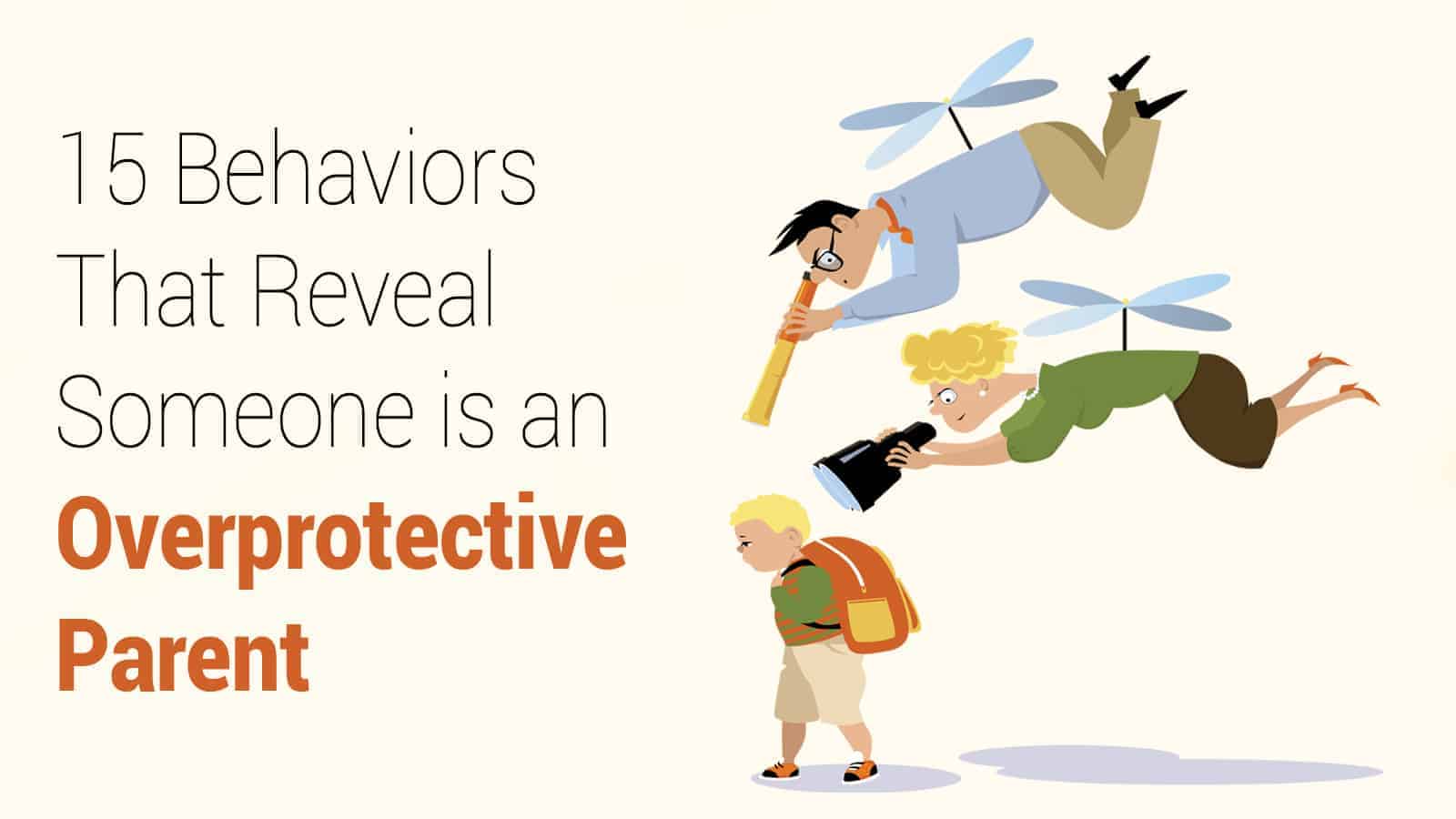A person may be an overprotective parent without even realizing that they are overbearing. It can be challenging to see the signs when you’re the one exhibiting them, but they are there. Being overprotective of children may sound like it could be a good thing, but that’s not the case. When a child has a parent like this, it can be hard for them to grow and develop on their own. Their self-confidence will suffer, and they will always question themselves.
Most overprotective parents have at least a few of the same behaviors. If you know to watch for them, you’ll be able to pick up on the type of parent someone is quick.
Behaviors That Reveal Someone is an Overprotective Parent
1. Overprotective Parents Micromanage
When a parent rules over every part of their child’s life, they are likely an overbearing parent. This habit can cause a child to stop pursuing their interests. Because of this, they may never know what they are genuinely passionate about.
Children should feel able to tell their parents which activities they would like to pursue. This rule applies to choosing new hobbies, sports, or if they want to spend the night at a friend’s house.
2. Going out of the way to Stop the Child from Failing
While no parent wants their child to fail, it has to happen sometimes. The need to prevent failure sometimes stems from not wanting the child to be upset. Other times, it is to prevent the parent from being embarrassed or viewed as imperfect.
No matter what the reason for preventing the failure is, it is a clear sign of overprotecting. It’s not suitable for the child, either. They should be permitted to fail so that they can learn their lessons at an early age.
3. Not Teaching Responsibility
If a parent cleans their child’s room, puts their clothes away, or makes their bed, they may be overprotective. While it may be quicker for the parent to do these things themselves, it isn’t beneficial to anyone involved. Children must learn responsibility at an early age to become responsible adults.
4. Overcompensate While Consoling
Parents are bound to feel bad when their child is upset. They may feel pain as they watch their child cry, pout, or have their feelings hurt. Even still, if they are overly-consoling their child, they may be overprotective.
Children have to learn to work through their emotions alone, which means they have to be allowed to self-soothe. Kisses when they get hurt, hugs when they are sad, or funny jokes to cheer them up are all fine. Don’t bribe them with toys, treats, or anything else over every incident, or they won’t learn to regulate their emotions.
5. Managing Friendships
Parents shouldn’t force their children into friendships with other kids. This statement means if a child doesn’t like their parent’s friend’s child, they shouldn’t have to be friends with them. A parent should let their child choose their friendships and only interfere if a relationship is harmful.
6. Always Telling Them to Be Careful
When a parent is continually telling their child to be careful, they may be an overbearing parent. While it is essential to warn kids of dangers, often scaring the child over every little thing isn’t beneficial.
If a parent is always warning their child that they may get hurt, they may become afraid to try new things. They will question their abilities, and their self-confidence will suffer.
7. Not Letting the Child try New Things
If a child has been playing a sport for years but wants to try something new, they should be allowed. The same goes for when they want to try a new club or camp. They should always be allowed to try new things and experience new situations.
It doesn’t matter if the child isn’t very good at something. They should be able to try anyway so that they can experience it for themselves.
When they can make these decisions for themselves, they’ll thrive because of it. They’ll have a better understanding of their strengths and passions. Plus, they’ll become more independent.
8. Constantly Checking in on Their Kids
Checking in with a child’s teacher each day is overkill because a teacher will reach out if there is an issue. While checking in once in a while is fine, it’s a problem when it is a daily occurrence. The same goes for when a child is at their friend’s house. Checking in once or twice is okay, but every hour is a bit too much.
It might also be a red flag of an overprotective parent if they are continually asking the child if they are okay. Another common question overprotectors may ask often is if the child needs anything. It is normal and encouraged that parents check in on their children. There should be a balance, and the child shouldn’t feel smothered.
9. Shielding the Child from the Real World
Life isn’t all happiness, and a child shouldn’t believe that it is. Instead, children should understand that life is sometimes disappointment or even scary. Parents should teach their children about the real world before they learn about it from their friends.
When a parent teaches the child, they can teach them how to handle situations appropriately. Otherwise, they may go along with their friends instead of making an educated, responsible decision.
Remember that kids see plenty of scenes on television or social media that are worse than real life. Allow them to have a real-life grasp of what the world is like. While overprotectors think they are helpful by shielding their child, they are doing the opposite, instead.
10. They Fight Their Child’s Battles
When a child fights with their friend and the parent gets involved, they are an overprotective parent. Likewise, if a child gets in trouble at school, and the parent argues about the punishment, it’s a good sign.
For the most part, children should fight their own battles, especially with their friends. They should be the ones to address their teacher when they feel they’ve been maltreated, too. A parent should only get involved when there is an excellent reason to do so.
11. They Fix all Negative Experiences and Get Angry Over Them
Parents naturally want their children to have the best life possible. Sometimes, they’ll even go to extremes to ensure their child never experiences a negative situation. This habit teaches the child that life is perfect and that bad things never happen.
As you can imagine, teaching a child that the world is perfect is a terrible idea. It sets them up for massive disappointment and can make negative situations seem even worse for them. Children have to experience hurt and disappointment to develop emotionally. If a parent allows the child to be disappointed now, they’ll be more resilient in the future.
12. They Don’t Allow Their Child to do Things Alone
Children are capable of more than we give them credit for. Letting the kids do things on their own will raise their self-esteem and make them more competent in the future. This type of parent may think that helping their child with everything is a good thing. This notion isn’t right, however, and it can cause problems for the child in the future.
Let children do things on their own and explore the world around them while they can be seen. This allows them to explore freely while also having a safety plan of an adult nearby. It will boost the child’s confidence and self-esteem.
13. They Aren’t Allowed to Spend Much Time at Friends’ Houses
An overprotective parent may not let their child spend much time at a friend’s house. This is true even when the parents know and are comfortable with one another.
You may notice that the parent always goes to friend’s houses with the child. Another sign is that the child isn’t allowed to go to sleepovers or camps.
14. The child Isn’t Allowed to Make Decisions
As explained before, children should be allowed to make some decisions for themselves. Of course, if it is a safety or health concern, the parent should make the best decision for their child. For smaller things, however, a child has to have the freedom of choice.
They should be allowed to choose their clothing (as long as it’s weather appropriate) or what they will drink. Another choice kids can easily make is which snack they want or which book they want to read.
15. Children are Not Allowed to Have Privacy
If a parent reads their child’s journal or diary, they may be overprotective. Likewise, if their child isn’t allowed to close their bedroom door, they are probably overbearing. The child may not be allowed to have secrets, and phone conversations have to be heard by the parents. This is destructive to children, especially as they grow into their teenage years.
Final Thoughts on Behaviors That Reveal Someone is an Overprotective Parent
It can be hard not to be an overprotective parent if it is generally in your nature. Being overbearing isn’t beneficial to the parent or the child, however. Once you know the behaviors that reveal someone is overprotective, you’ll be better able to watch for it. If you find that you are overprotective of your kids, now is the time to make a change.



















